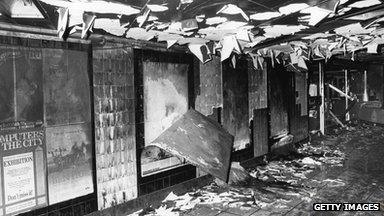King's Cross fire 25th anniversary marked
- Published

The remains of the King's Cross ticket hall after the fire in 1987
The 25th anniversary of the fire at King's Cross Underground station has been marked as unions raise concerns over Tube and fire service cuts.
Thirty one people died when a fire on a wooden escalator engulfed part of the London station on 18 November 1987.
The blaze is thought to have been started by a dropped match which set alight material below the escalator.
The relatives of victims and members of the fire service gathered at the station to remember those who died.
Staffing call
The Blessed Sacrament church near King's Cross offered a remembrance Mass.
Sophie Tarassenko went to the station to remember her brother Ivan who was 25 when he died.
She laid flowers at the memorial in the station's ticket office.
She said it was important to remember "so that the management today of London Underground and the people who work in it have it uppermost in their minds that it never happens again".
She said: "I'd always hope in a system that carried millions of people a day like an airline, that safety would be the last thing compromised as a result of financial cuts.
"The welfare of the travelling public has to be uppermost."
Sophie Tarassenko, whose brother Ivan died in the fire: "The overwhelming emotion is still sadness"
She added that her overwhelming emotion was still sadness that her brother "never got to live life as he should and that we never got the benefit of his wonderful company as we should".
Bob Crow, the RMT union's general secretary, used the anniversary to highlight the importance of safety.
He said: "Due to a culture of complacency and systemic failure, 31 people lost their lives at King's Cross."
He has called for London Mayor Boris Johnson to withdraw the threat of cuts to staffing levels and maintenance schedules and abandon plans to introduce more driverless trains.
A number of measures were introduced following the fire, including the phasing out of wooden escalators. A ban on smoking in all areas of the Tube had been introduced two years earlier in 1985.
London Underground's chief operating officer said the Tube was now one of the safest rail systems in Europe.
Improved safety
Howard Collins said it was "all wrong" of the RMT to "politicise" the event.
He added: "Our stations are staffed at all times while services are operating and we have been absolutely clear that we will never compromise on safety."
More than 100 people were taken to hospital after the King's Cross fire.
About 150 firefighters fought the blaze. One of them - Station Officer Colin Townsley - was among the dead and was posthumously awarded the George Medal for his selfless act of bravery.
London Fire Commissioner Ron Dobson said: "Thirty one people, including firefighter Colin Townsley, lost their lives at the King's Cross fire 25 years ago.
"The fire was a tragedy and my thoughts are with the friends, families, and loved ones of all those who lost their lives. We also pay tribute to all of the firefighters who bravely fought the blaze, which was undoubtedly the biggest challenge any of them would ever face."
Matt Wrack, general secretary of the Fire Brigade Union, said it was a "terrible irony" that London Fire Brigade was looking at "huge cuts".
He said the closure of 17 fire stations, outlined in a leaked document, would reduce the ability to fight similar fires in the future.
But Mr Dobson said: "No decisions about any possible fire station closures have yet been taken. Before they are, there will be a full public consultation."
- Published18 November 2012
- Published18 November 2012
- Published17 October 2012